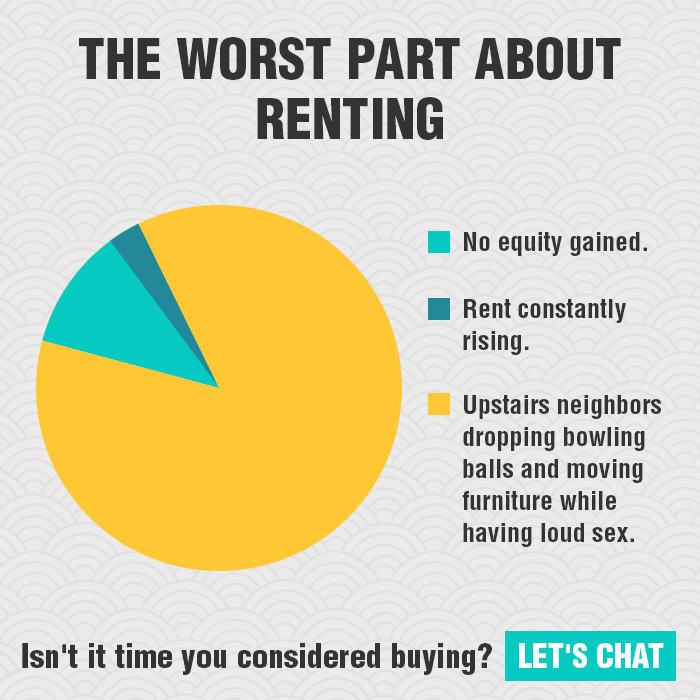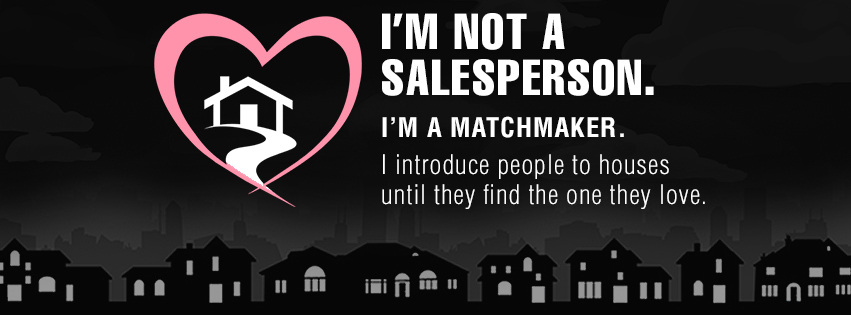FAQ during the home buying process
Why should I buy, instead of rent?
A home is an investment.
Buying a home in order to build equity is one of the main financial reasons prospective buyers jump into the market, but many people also yearn for the satisfaction of home ownership.
When you rent, you write your monthly check and that money is gone forever. But when you own your home, you can deduct the cost of your mortgage loan interest from your federal income taxes. At the beginning on a loan most of your payment is going towards interest.
You can also deduct the property taxes you pay as a homeowner. In addition, the value of your home may go up over the years. Finally, you’ll enjoy having something that’s all yours – a home where your own personal style will tell the world who you are.
Reasons to Rent
- Flexibility. Check out neighborhoods if you are new to town or are researching where you want to buy. By renting you can test an area without committing to it.
- Uncertainty in your career. If you think you might need to move in the near future, you might want to rent, since buying ties you down to a greater extent.
- Uncertainty in income. If you expect a pay hike or pay cut in the near future, that can change your borrowing ability as well as impact your ability to pay a mortgage.
- Got bad credit? Creating a history of on-time rental payments can help you build the sort of credit you need.
- Low maintenance. When the pipe leaks under the sink, you call the landlord.
Reasons to Buy
- Equity. When you pay rent, you don’t own anything. When you pay a mortgage, you increase your degree of ownership in your home with every payment. Also, you can borrow against your ownership (or equity).
- Tax deductions. You can deduct mortgage interest as well as your property taxes. Not only that, but if you meet certain requirements the IRS won’t apply a “capital gains” tax on your profits from the sale of your home. You can keep the first $250,000 in profit you make when selling the home if you’re single, or the first $500,000 if married.
- Creative control. Go ahead and paint them yellow! Wish you had another room? Go ahead and add one.
- Maintenance choices. If you live in a house, you can decide how to approach maintenance, either doing it yourself or picking your own contractor.
Should I use a real estate agent? How do I find one?
Using a real estate agent is a very good idea. All the details involved in home buying, particularly the financial ones, can be mind-boggling. A good real estate professional can guide you through the entire process and make the experience much easier.
With immediate access to homes as soon as they’re put on the market, the agent can save you hours of wasted driving-around time.
When it’s time to make an offer on a home, the agent can point out ways to structure your deal to save you money. An agent will guide you through the paperwork, and be there to hold your hand and answer last-minute questions when you sign the final papers at closing. And you don’t have to pay the broker anything! The payment comes from the home seller – not from the buyer.
What does a buyer’s agent do for you
What is a mortgage?
A mortgage loan is a loan that a bank or lender gives you to help finance the purchase of a house. It is most advantageous to borrow approximately 80% of the value of the house or less. The house you buy acts as collateral in exchange for the money you are borrowing to finance the mortgage for a house. A mortgage payment is composed of four parts: principal, interest, taxes and insurance. It is normally paid on a monthly basic.
Principal
Principal is the total amount of money you borrowed to buy the home
Interest
Interest is the price that you pay to borrow money from your lender.
Taxes
Taxes are the property taxes you pay as a homeowner. They are typically calculated based upon the value of your house.
Insurance
Insurance includes homeowners insurance and could include private mortgage insurance (PMI). You are required to get homeowners insurance by your lender to cover your house and possibly the property inside. If your down payment is less than 20%, you will have to pay private mortgage insurance which protects the lender if you default on your mortgage loan.
Mortgage Note
When you get a mortgage you will sign legal documents known as a mortgage note that promise you will repay the balance of your mortgage, with interest and other possible costs over a set period of time.
If you default on your mortgage payments, the lender is allowed to take back your house and sell it. This legal process is known as a foreclosure.
How do I find a lender?
You can finance a home with a loan from a bank, a savings and loan, a credit union, a private mortgage company, or various state government lenders. Different lenders can offer quite different interest rates and loan fees; and as you know, a lower interest rate can make a big difference in how much home you can afford.
Shop for a loan before your decide. Most lenders need 3-6 weeks for the whole loan approval process. Ask your Realtor for a referral.
What is Mortgage Pre-approval?
Though there are several different definitions of “pre-approval” used in the mortgage industry, a pre-approval generally is a written statement from a lender stating the lender’s preliminary determination that a borrower would qualify for a particular loan amount under that lender’s guidelines. The determination and loan amount are based on income and credit information. Most pre-approval letters are good for 60 to 90 days.
Does Pre-approval Guarantee a Loan?
No. Even if you receive a pre-approval letter from a lender, you may not get a loan from a lender and you are not guaranteed a specific rate or loan term.
Regardless of pre-approval, a lender may require additional income and asset verification, as well as the satisfaction of other conditions, before extending you a loan. Pre-approval letters are subject to modification or cancellation if your financial situation or other conditions change.
Why Should You Get Pre-approved?
There are many reasons why you should get pre-approved. The most important reason is that you will get an accurate idea of how much home you can afford. This can help to target your home search and ensure you only look at houses that are truly in your price range.
A pre-approval letter also helps you prove to real estate agents and sellers that you’re a credible buyer and able to act fast when you find the home you want to buy. Some sellers might even require buyers to submit a pre-approval letter with their offers, though having a pre-approval letter does not guarantee that your offer will be accepted by a seller.
A pre-approval letter can make you stand out in a competitive real estate market.
What Details Are Required in the Pre-approval Process?
A lender will generally start by asking for some basic information about you and your financial history. If you have a co-borrower, the lender will also need this information about them. Generally, a lender will then request your Social Security number and permission to pull your required credit report.
If the information you provide and the information obtained from your credit report satisfies the lender’s guidelines, the lender will make a preliminary determination in writing stating that you would qualify for a particular loan amount subject to the conditions outlined in your pre-approval letter. Please note that each lender has its own standards and processes for determining whether to grant a pre-approval letter.
What do I need to take with me when I apply for a mortgage?
- Social security numbers for both your and your spouse, if both of you are applying for the loan
- Copies of your checking and savings account statements for the past 6 months
- Evidence of any other assets like bonds, 401K, stocks, etc.
- Recent paycheck stub detailing your earnings
- A list of all credit card accounts and the approximate monthly amounts owed on each
- A list of account numbers and balances due on outstanding loans, such as car loans, student loans, etc.
- Copies of your last 2 years’ income tax statements
- The name and address of someone who can verify your employment.
Depending on your lender, you may be asked for other information.
What If You Can’t Get Pre-approved?
- Work to improve your credit score. Your credit score is impacted by payment history, outstanding debt, the length of your credit history, recent new credit inquiries, types of credit used, and more. Generally a score of 720 and higher will get you the most favorable mortgage rates.
- Correct any errors on your credit report, which could help to raise your credit score. The lender will analyze your credit report for any red flags, such as late or missed payments or charged-off debt.
- Decrease your overall debt and improve your debt-to-income ratio. In general, a debt-to-income ratio of 36 percent or less is preferable.
- Increase your down payment amount in order to qualify for a larger loan.
Should I rent to own (lease purchase)?
How much money will I have to come up with to buy a home?
In general, you need to come up with enough money to cover three costs: earnest money – the deposit you make on the home when you submit your offer, to prove to the seller that you are serious about wanting to buy the house; the down payment, a percentage of the cost of the home that you must pay when you go to settlement; and closing costs, the costs associated with processing the paperwork to buy a house.
If the offer is accepted, your earnest money will be applied to the down payment or closing costs. If your offer is not accepted, your money will be returned to you. The amount of your earnest money varies but it’s usually 1% of the sales price (excludes all cash purchases).
The more money you can put into your down payment, the lower your mortgage payments will be. Some types of loans require 10-20% of the purchase price.
Closing costs – which you will pay at settlement average 2-5% of the price of your home. These costs cover various fees your lender charges and other processing expenses. When you apply for your loan, your lender will give you an estimate of the closing costs, so you won’t be caught by surprise.
How Do Appraisals Affect Your Mortgage?
During an appraisal, an expert evaluates your home and property and gives you an estimate on how much it is worth. Appraisals are conducted by professionals who are licensed by the state.
When do you get an appraisal?
Often, your mortgage lender will require you to get an appraisal on the home you want to buy before they will lend you the money to buy it. This helps them ensure the property could sell for the amount of money they are lending you. So, if the asking price of the home is significantly higher than the appraisal value, the lender might not lend you the money.
If you are refinancing your home, your lender will likely want an appraisal for the same reason.
What does an appraisal cost?
The average appraisal costs about $400-$450, but that figure varies depending on the size and value of the home (appraisals typically cost more for larger and more valuable homes).
What do appraisers look for when they value your home?
To determine the value of the home, the appraiser will look at the size and type of the home and property, the condition the home and property and the overall real estate market in the area (what are similar homes selling for?). Basically, the appraiser is trying to determine the fair market value for your home, so most anything that would lower or increase the price someone is willing to pay for your home may be considered.
What can you do to increase the appraised value of your home?
The condition of your home affects its appraised value. So, you can increase the value of your home if you do repairs and improvements. Speak to your Realtor about possible improvements that might effect the value.
When I find the home I want, how much should I offer?
Your Realtor can help you here. But there are several things you should consider:
- Is the asking price similar homes in the area?
- Is the home in good condition or will you have to spend a substantial amount of money making it the way you want it?
- How long has the home been on the market? If it’s been for sale for awhile, the seller may be more eager to accept a lower offer.
- How much mortgage will be required? Make sure you really can afford whatever offer you make.
- How much do you really want the home? The closer you are to the asking price, the more likely your offer will be accepted. In some cases, that may mean offering more than asking, if you know you are competing with others for the house.
So I’ve submitted an offer, now what?
The seller can either accept the offer as is, counter offer or reject the offer. In most cases the seller will at least counter offer. But don’t let that stop you. Now you begin negotiating.
You may have to offer more money, but you may ask the seller to cover some or all of your closing costs or to make repairs that wouldn’t normally be expected. Often, negotiations on a price go back and forth several times before a deal is made. Just remember – don’t get so caught up in negotiations that you lose sight of what you really want and can afford!
My offer has been accepted, now what?
Ask your Realtor for a timeline through closing. In most cases buyer would have paid and requested an option period in which they can preform an inspection. Use this time wisely and inspect the home for anything that may concern you. At the very least hire a general home inspector.
So what will happen at closing?
You will sit at a table with your agent, the agent for the seller, probably the seller, and a closing agent. The closing agent will have a stack of papers for you and the seller to sign. While he or she will give you a basic explanation of each paper, you may want to take the time to read each one and/or consult with your agent to make sure you know exactly what you’re signing.




